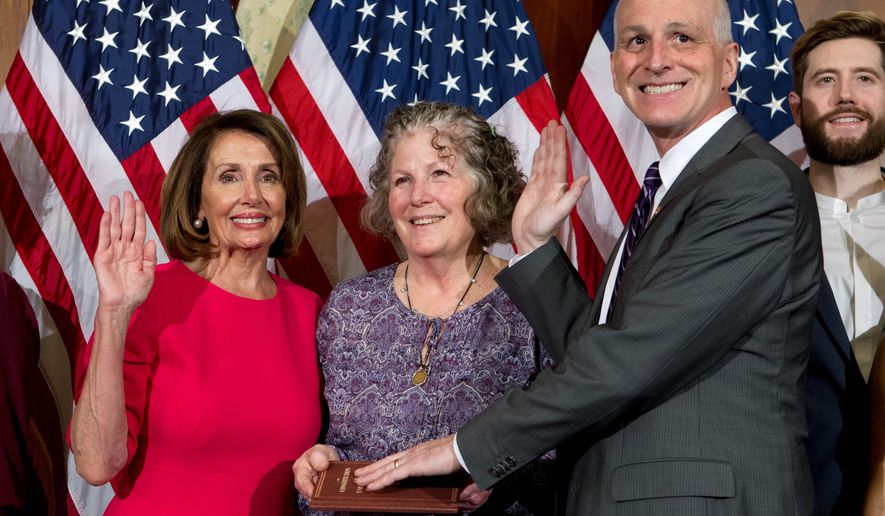The new Democratic majority on the House Armed Services Committee has released its first blueprint for the nation’s defense budget, a $733 billion authorization bill for the Pentagon for the coming fiscal year that blocks any funds for President Trump’s border wall, puts new restrictions on the Guantanamo terrorist detainee prison, and includes no money for Mr. Trump’s proposed Space Force.
“I think we need to have spending discipline within the Pentagon, [and] 733 is a good number,” committee Chairman Adam Smith, Washington state Democrat, told reporters Monday.
The House panel’s version of the budget differs sharply from the Republican-led Senate Armed Services Committee’s $750 billion draft released last month. The Senate panel gave Mr. Trump a victory on the top-line spending and the establishment of a Space Force, but also pared back his requests for a border wall with Mexico by billions of dollars.
The full House panel is set to meet Wednesday for a lengthy mark-up session for the bill.
The House version sets a baseline budget of $655.9 billion for the Defense Department, with an additional $69 billion to finance combat operations in Afghanistan, Iraq, Syria and elsewhere as part of so-called “Overseas Contingency Operations.” It also includes $8.2 billion in funds that outside of the House panel’s jurisdiction.
Mr. Smith defended his committee’s top-line figure.
“Throw $17 billion at people in the last minute they’ll spend it,” he said Monday. “Whether or not they spend it well I think is highly debatable.”
The House defense authorization bill proposes over 1,000 policy provisions, including a “blanket prohibition” on border wall spending from the services’ military construction and other Pentagon accounts. House lawmakers also included a measure that blocks the Trump administration from moving defense dollars dedicated to counternarcotics operations to wall construction.
In the Senate’s version, $3.6 billion of the overseas contingency funds would be available for construction projects along the southern border — well below the $8.6 billion Mr. Trump requested in his initial budget proposal in March. The differing figures for one of Mr. Trump’s signature priorities could portend another government showdown over wall financing.
There are other significant clashes between the two chambers.
Mr. Smith’s “chairman’s mark” for the bill includes a provision prohibiting the Trump administration from sending new detainees to the military-run prison at Guantanamo Bay. The military would also be barred from sending the last remaining Guantanamo detainees to Libya, Somalia, Syria or Yemen.
The Senate plan includes funding for a Space Force as a component of the Air Force, which marked a significant victory for Mr. Trump and supporters of the potential sixth military branch. The House’s version lacks language to fund the concept.
“I think the Air Force has not done a very good job at managing space,” Mr. Smith said. “They have mucked it up in a variety of different ways.”
The Trump White House reinstituted U.S. Space Command earlier this year, putting it on par with organizations like U.S. Central Command and U.S. Cyber Command. Air Force Gen. John Raymond has been tapped by the White House to lead the new command.
Despite what is set to be a contentious battle between the two parties over numerous provisions of the defense bill, Mr. Smith applauded his Republican counterpart, Texas Rep. Mac Thornberry, for being a “tremendous leader,” on budget negotiations.
“He has a patience for the details and the knowledge of the details here. I think it’s been a real asset for the committee,” Mr. Smith said.
“We have to get this done,” Mr. Smith said. “It is important to the national security of this country for us to do our work and therefore we will do it.”
• Carlo Muñoz can be reached at cmunoz@washingtontimes.com.
• Lauren Toms can be reached at lmeier@washingtontimes.com.




Please read our comment policy before commenting.